R.J. Crayton's Blog
July 21, 2021
Knowing What You Love and Writing It
 Source: Pixabay
Source: PixabayThis past year of the pandemic has been an enlightening one for many people. There are lots of stories of people rethinking what they want to do. The change in the way people lived, the loss of life to the virus, and just a general reminder that life is short has made a lot of people think about how they want to live.
Many people got the option to work from home and loved it. I know I have loved doing my day job from home, and not having to go into the office. Not to say that my office wasn’t nice, but there is a certain flexibility that one gets when their office is home. The ability to go for a mid-day walk or run an errand and know you could just stay a bit later to finish up was nice.
The change has been so life-changing for many that lots of people are leaving their jobs, and one survey said 95 percent of people are considering leaving. That doesn’t mean they’ll all walk out the door, but it means they are looking to see if there is someplace that better meets their needs.
Similarly, I’ve been thinking about how I want to live my life and what I want to write about. I’ve had many ideas for books, and I have an entire file on them, on things that are ideas that I’ve come up with and like. Some ideas feel like they’d be more commercially successful, and some are ones that I’ve started and gotten pretty deep into.
The interesting thing is that I’d started a novel a couple of years ago and finished it, but didn’t actually like the way it ended. I’ve been tinkering with it on and off to see if I could figure out where it went wrong and how to make it work. Only, after this past year, I’ve realized that that novel isn’t really what I’m interested in writing. It’s not where my heart is. My heart wants to go back to Life First. Book three of that series wraps up all the loose ends but one: Dr. Stephen Grant.
And my mind has gone to him many times over the years. While the book series is still probably my favorite, as it’s my first series, it never had the kind of commercial success I would have liked. Because of that, I’ve put off writing Dr. Grant’s story in favor of doing other series.
Yet, after the year we’ve had, and after reading a bevy of books on self-discovery and living a fulfilling life, I’ve decided that I want to prioritize the things I love. And that means the things I really want to write. And I really want to write Dr. Grant’s story. So, that’s going to be my project for the rest of 2020. In my mind, I had this notion that I could finish the first draft by the end of this month if I went on this intense writing schedule. Only, I’ve realized with my day job and other things going on in my life, that wasn’t really feasible.
However, the end of the year is feasible. And what’s more, I’m really excited about it. I went through and outlined all the chapters last week, and then I started writing. I’ve been able to sit and work on it on and off at various times, and I must say, I’m loving finally fleshing out this story. I feel like all the hints are there in the previous books that give glimpses into who Dr. Grant is. About what has happened to him. But, seeing the whole measure of it laid out is very fulfilling. I can’t wait to write the chapters, get it edited and get it out to the world.
What’s interesting to me is that it’s taken me this long to figure out what I should be writing. That this was the story that needs my focus. I was thinking about how in college I made a move that I knew was right for me, one that people discouraged me from making, but I didn’t care because I knew I couldn’t live my life on that other path. My memory is that I had agonized over it somewhat. The decision being to change my major. I’d started off in engineering, and it was a path pushed on me by all the school people who suggested that STEM were the fields where everything was at, including the money. I was such a good kid, I followed the advice of teachers and my parents, but I remember being in college that first year and taking the engineering courses and being bored and unhappy and thinking, I couldn’t do this for the rest of my life. And I switched to journalism. Lots of kids switch majors in college, so I didn’t think of it as a big deal, but in retrospect, it was. It was the first real-life decision that I made that said to myself, that said with real clarity, that my happiness, that my fulfillment mattered. That going through the motions for money was not who I was and not necessary to live a fulfilling life.
I feel a little bit like I’ve coasted since then, figuring, knowing I’d made a good choice about living. The last year has been a chance to stop coasting and start thinking. Thinking about what makes me happy to write about. And while a new book or new series is more likely to sell than an old series that hasn’t taken off, it’s the old series that I want to complete. I want to tell the next two chapters of this story. One that provides deep perspective on events of the previous book, and also one that sets us up for a new chapter that finally ties everything up, neat as a bow.
Sometimes when we’re writing, it can feel like the story isn’t coming together because we don’t know how to make it come together. But, I realized this year that a story not coming together can be a sign that you’re trying to tell the wrong story. When you’re trying to tell the right story, it comes to you, and even if it’s not working perfectly, it keeps drawing you back to it. I’m super excited to be engaged in telling the right story.
So, has the pandemic year caused you to rethink anything or shift priorities?
July 13, 2021
Getting Real About a Living Wage
I saw a friend on Facebook with a long post on how much the people who work in grocery stores, deliver things, clean hospitals, did during the pandemic and how because they helped keep things going, it was really important to ensure these workers get a living wage.
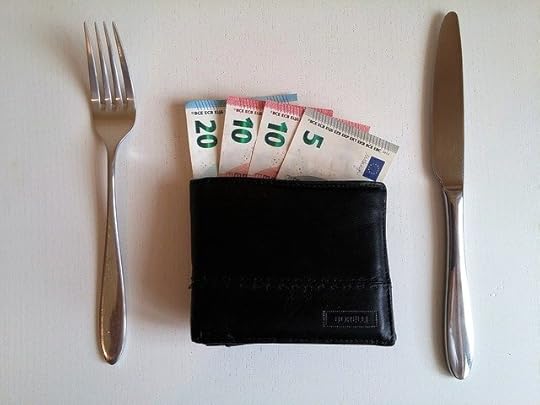 Source: Pixabay
Source: PixabayAnd while I could absolutely see the reason he was making the appeal that way, I have to say that I disagree with a fundamental premise of it. Those people don’t deserve a living wage because they kept society running during a pandemic. They deserve a living wage because they are human beings who are working. That’s it. They could be photocopying at Kinkos (yes, I’m old; this may not even be a job anymore) or manufacturing Tiki Torches. They could be working full-time or part-time; it doesn’t matter. The wage we pay human beings should be one that allows them to pay for food, shelter, and save a little, if that job is worked 40 hours a week.
Because we are all humans, we all need the basic necessities, and if a person is working, their salary should be able to accord them this.
People who complain about raising the minimum wage to a living rate often use the argument that these are jobs intended for high schoolers. Are high schoolers somehow subhuman? Do they suddenly not deserve the same rights as other employed people? If someone said, well, those people are middle-aged, they shouldn’t get paid the same, would that fly? Would that be acceptable? If somehow you being in the group the policy is being applied to makes it sound unfair, then it’s probably not a good policy. Teenagers who have jobs are often working because they need to. They need to save for college. They need to help support their family. They need to gain experience at earning a living and managing their money. That does not mean they should be paid unfair wages.
And of course, what about the non-high school person who takes that job? Should they be paid differently because they’re not just a kid? And how would that work in terms of discrimination laws?
The other argument people have is that these jobs get paid less because the person didn’t go to college or obtain the right credentials to earn higher pay. Again, this is a social construct that elevates one group of people artificially, while dehumanizing the other. “If you don’t do what X-group says, you don’t deserve enough wages to survive. You should die.” That’s the general theory behind that argument. Didn’t go to college–you deserve subhuman wages. One could flip the argument, and say, people who went to college or earned graduate degrees spent years wasting time and instead should have been out helping society by doing jobs that keep it running, and therefore they should be paid less. They’re lazy people who just want to sit around thinking and not doing. The same people who make the argument that lack of education is why people deserve such subpar wages would be aghast if someone made the previous argument related to why they deserved subpar wages.
We need to stop othering people, and view them as someone who is like us, and treat them the way that we would want to be treated. If we took a job that wasn’t something that was perfect, we would want to be able to afford to live. We would want a living wage. We should want that for everyone because we view that as human beings, who are like us.
When we other people, and view them as subhuman and not like us, we make excuses to do horrible things to them, like pay them less than a living wage. A wage we ourselves would never want to work for or think we deserved.
I do hope more states pass living wage laws, and that Congress can get an inflation-adjusted federal minimum wage. People are all deserving of the basics. And while I know there are a lot of inequities and problems out there, a living wage shouldn’t be one of them.
I will leave you with the words of Franklin Delano Roosevelt, who said it best:
It seems to me to be equally plain that no business which depends for existence on paying less than living wages to its workers has any right to continue in this country. By “business” I mean the whole of commerce as well as the whole of industry; by workers I mean all workers, the white collar class as well as the men in overalls; and by living wages I mean more than a bare subsistence level-I mean the wages of decent living.
Franklin D. Roosevelt, June 16, 1933
July 6, 2021
You Know You’ve Hit on Something When the Same Theme Keeps Popping Up
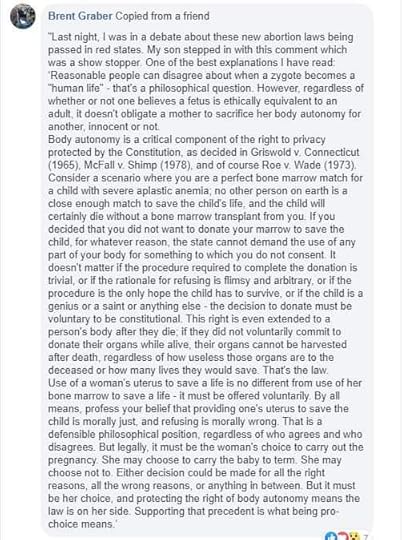
When I wrote Life First, my thoughts on the topic really emerged from ideas around bodily rights. Just who does our body belong to, and are we ever required to sacrifice our body to help someone else?
I think in societies, people make choices all the time to risk life and limb to save others. That’s a good things. Societies are inherently social. We have the desire to help one another. It’s our most basic instinct. Yet desire is different from obligation. It’s different from a requirement, and so as I thought about autonomy in general, it came to me both in the instance of pregnancy–where you have two lives that inexorably linked because one–for an extended period of time–needs the other to survive.
I came across this posting on Facebook the other day. A friend of mine had posted it on her page, and I paused a moment when I saw it because the author was thinking along the same lines as I had been thinking. That our bodies are our own. And that we shouldn’t be required to sacrifice any part of our body to save someone else. If we presume that a fetus is a person at conception, then we must treat it like any other person. There is no other person who can come demand us fork over our body to ensure they survive. There is no stranger who can say, you must eat extra calories each day for six months or I will die, and have a court that would say, yes, you do that.
The interesting thing that people will get up in arms about when you present a person with an argument like this is, they often times will say, “Hey, a few extra calories aren’t harmful. The person should do it.” And I would agree that a person might want to agree to doing that. I mean, if that will save another person’s life. Absolutely try. But, it’s not a question of should. It’s a question of must. And I think we have to decide in favor of free will and choice in that matter.
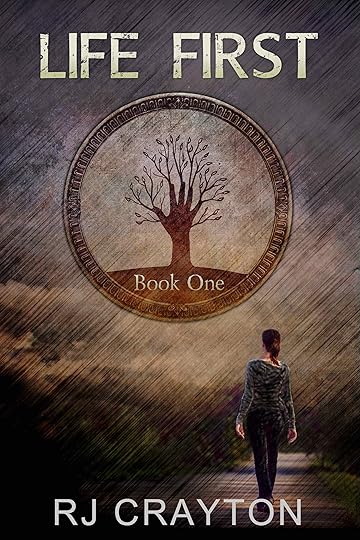
Of course, that is what Life First is about. The question of whether Kelsey should get to choose autonomy over her body and what happens to her organs, or if she must submit to a surgery she doesn’t want to give her kidney to a man who she doesn’t know.
Interestingly, people will sometimes view the dilemmas as somehow different, but I don’t think they are. Choices over whether to help someone live through the use of your body should always be up to the person. The good news is people are inherently social. Societies wouldn’t exist without a giving spirit, at some level, and lots of people do help.
The interesting thing to me is that this notion pops up from time to time in different places I see online. And I think that’s a good thing. It’s a sign that a major concept in the novel is fundamentally sound. And that knowledge makes me happy.
June 29, 2021
Real-Life Musicals?
So, ever since I was a kid, I have loved musicals and loved singing songs from musicals in the privacy of my own home. I’ve always wondered why more people don’t just break into song in their real lives. Though, I guess the answer is most of us can’t create catchy lyrics that capture the exact spirit of what we’re feeling on the fly.
Though, we could totally do a Zoey’s Playlist type of deal, where we find a real song that captures the general tenor of how we’re feeling at that moment (and because it’s a real song, it would be catchy and musical and all the stuff we non-songwriters can’t do on the fly). And, as an aside, I am so, so, so bummed that NBC canceled Zoey’s Playlist. It was one of my favorite shows.
But, I’m digressing. The other day, I was home and in the kitchen by myself and felt like singing Loverly from My Fair Lady, while I made oatmeal. Fun was had–until I decided to add in a musical spin and promptly spilled my oatmeal. Word to the wise, don’t ad-lib choreography. Practice first. Again, which is probably why real-life musicals don’t happen. A real-life, spontaneous musical would probably be poorly lyricized and badly choreographed, though lots of fun for whoever was doing it–until it all went bad (as it did with the spilling and cleaning of oatmeal; though totally fun up to that point).
It got me thinking, though, if you were thrust into a real-life musical and the spotlight shone on you to sing–what song would you pick and why?
Share if you dare!
June 22, 2021
Taking Care of Yourself During These Trying Times
Even as things are getting back to normal as the vaccination rate increases, life is still hard for a lot of folks. Living a year in a pandemic is mentally trying and the fact that one is vaccinated and fairly safe does not mean everything springs back to normal.
There is still trepidation, and there are still the lingering after effects from the isolation.
This year, as suicide rates rose–especially among teens and young adults–the mental health of the nation has been a focus. Recently, tennis player Naomi Osaka (the world’s highest-paid female athlete) pulled out of the French Open and Wimbledon to take care of her mental health.
While Osaka initially took flack for just wanting to pull out of the portions of the tournament that heightened her anxiety and depression, she got mostly praise for taking time off from tennis altogether. I’m not sure what that says about our culture and work ethic, though. Does it suggest that figuring out specifically what drains you and dealing with that is bad (because you must do everything put before you)? Does it suggest that the only thing you can do when you have a mental health problem is drop out of society to deal with it? That you can’t work while you work through mental health challenges?
I don’t know. And I don’t know what the best thing is with a mental health challenge. Some, like deep depression or suicidal thoughts, may need to be comprehensively treated before you can attend to other parts of your life. But I would imagine, other challenges should allow you to continue to work, with an accommodation, as you forged ahead on your mental health challenges.
Regardless of which approach is best, I do think Osaka’s plight reminds us that we do need to take time to deal with our mental health. That’s the foundation of who we are and where we’re at. We need to be strong mentally, so we can function in our lives and support those who need supporting. It is a joy to help others, but sort of like in the airplane emergency situations, we have to put our oxygen masks on first, before we help others.
Our mental well being is our oxygen mask. It’s important to tend to it.
Do you have a plan for taking care of your mental health? If so, what do you do when you see the stress coming for you?
Re
June 8, 2021
Changing Things Up
So, hope all are well. With the abundance of vaccine available, I hope everyone has been able to get their shots, at least here in the US. I know some other countries haven’t had the same access.

Since I hadn’t blogged in a while, I thought I’d pop in and give a brief update. I’ve decided to change up a couple of things. When the pandemic hit, I pulled most of my books into Kindle Unlimited, figuring many people were economizing and might prefer that way of accessing books.
In retrospect, that wasn’t ideal. So, now I’ve decided to take some titles wide again, and will eventually move them all in that direction as their KU terms end.
I’ve also decided to return Life First to free for the first book, and lowered the price of book two in the series. This is because I’m finally working on the fourth book in the series, and think it will make a nice segue for new readers. I hope to finish book 4 over the summer and release it this fall.
With that, I’m changing the free book I’m offering for subscribing to the mailing list. So, that will be a change. I’ll have to see how that works out. I’ll let you all know.
Finally, as Amazon print publishing is now allowing paperbacks, I put the Life First series into hardback, as well. I’m not sure if that’s going to be a popular option, as hardback books are so much more expensive than paperback, but it will be interesting to see. I ordered proof copies to see how they look and really think they look good. Hardback really sits on the shelf nicely. I am having some issue getting the hardback linked to the other versions of Life First (but not Second Life and Third Life). So, weird, but nothing I can’t handle.
That’s about it for the update. I’ll write again next week.
Take care.
-RJ
March 7, 2021
How Do You Find Your Diverse Reads?

I was searching for something on Amazon the other day and went down the recommended rabbit hole, and found a couple of fun, diverse reads that I picked up (I grabbed this adorable kid’s book, The Big Bed">The Big Bed, and this interesting take on a fairy tale character, Cinderella is Dead).
As I happened to stumble upon these books that I ultimately ended up buying, I thought I’d check in with you folks out there and ask how you find your diverse books? Do you ask friends? Does Amazon recognize your patterns and recommend titles to you? Do you always have to search them out? For me, I often find these books with recommendations from friends. I used to see them more often perusing bookstores in person. With the pandemic, I haven’t been to that many places where I would just hang around. I shop with purpose and try to avoid exposure. I admit, I’ll be glad when we have mass vaccination and we can do more casual browsing like before.
So, how do you find your reads and what are some good ones you’ve found lately? Share in the comments.
March 1, 2021
Pushing through the pandemic
It’s been almost a year since the pandemic closures began here in the U.S. It’s frustrating to see countries like China and Australia to have gotten through the worst and be on the other side, while this country still suffers.

It’s tiring and it makes you feel weary. But, we have to push through. For everyone, pushing through is different. Some people are bingeing Netflix, some people are getting into better shape, some are baking, some are taking up hobbies.
For me, I’ve been listening to a lot of audiobooks, which has been good, and watching the occasional flick I’ve heard good things about but not seen. (I watched 13 Going on Thirty the other day on HBO. [Sidenote: Bone to pick with HBO search function, as I couldn’t find the film when I typed in “thirteen,” but it showed up with “13.”] That was a great little flick.)
This last year has been tough with the pandemic, but not as tough as it could have been. None of my immediate family have gotten sick or died from COVID-19, and we’ve all been able to stay employed, which has been good. So, I’m thankful for the good things, and trying to keep at it and push through.
What are you doing to push through the pandemic?
February 20, 2021
I Can Now Say These Books Are Out of This World
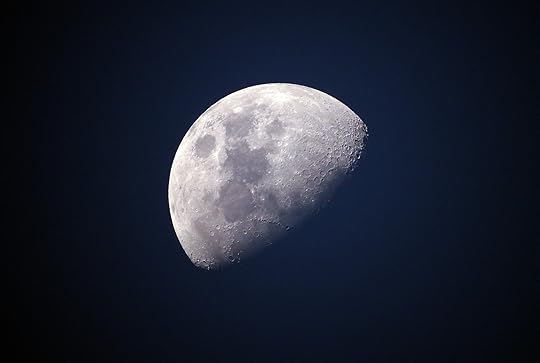
Howdy!
It’s been a long time since I’ve written, but I did want to take a moment to fill you in on a project I just became involved in. I’m a participant in Writers on the Moon, a project that sends a time capsule of independent authors’ work to the moon (yes, the one up in the sky). The project is spearheaded by author Susan Kaye Quinn. She is a rocket scientist, as well as an author, and thinks the archaeologists of the future will find our works worth exploring. (And perhaps even, if there is extraterrestrial life out there today, they’ll enjoy our stories).
As such, I secured a 20MB slot to send my work to the moon. It is super exciting because explorers and archaeologists of the future will have the opportunity to see the works of authors in a variety of genres from our time.
Another very awesome thing that I got to do was include stowaways. That means I could include other people’s work in my 20MB. I was able to include several author friends, as well as some nonauthor friends, and a piece from my journalism writing.
I’m very excited about the work being launched to the moon. We created a “ReadMe” file that talks about the work that is included. That will be on the Writers on the Moon website shortly. I don’t want to be duplicative, but I will probably post my ReadMe file here on my blog in a few days, as well.
I think it’s super cool to be able to go to the moon and include writing. If you were going to include something to go to the moon, what would you put in your capsule?
January 25, 2021
Random Acts of Freeness
We’ve all heard of random acts of kindness, where people just do something kind for another person.
Well, today I thought I’d do a random act of freeness. More specifically, I’ve made my book Concealed free on Amazon. It will be free today and tomorrow.
I realized I was coming up on the end of my Kindle Unlimited term, during which you get up to five days of free giveaways. Between my personal life and the pandemic, I’ve had a lot on my plate and hadn’t been keeping up with all the Unlimited terms. Normally, if I were doing a free giveaway, I’d spend some time advertising it, let people know, and plan it out a bit.
When I realized I could only do two days (today and tomorrow) before my term ended, I thought, why not offer it up free. It was kind of random, but it felt right. Since 2020 was such a sucky year filled with pandemic, why not start 2021 off right with a random free giveaway of a book featuring a pandemic. Thankfully, our real-life pandemic is much less deadly than the “Hell” virus in Concealed. Though, our real-life pandemic is real and doesn’t go away when we close our book. So many people have been harmed, either directly or indirectly by COVID-19. The toll on both physical and mental health has been too great, and I hope the vaccine distribution is able to speed up to get more people vaccinated.
In the mean time, here’s how to grab this random act of freeness. You’ll find Concealed on Amazon US, Amazon UK, Amazon Canada, and Amazon Australia. Concealed is the first book in the virus series.

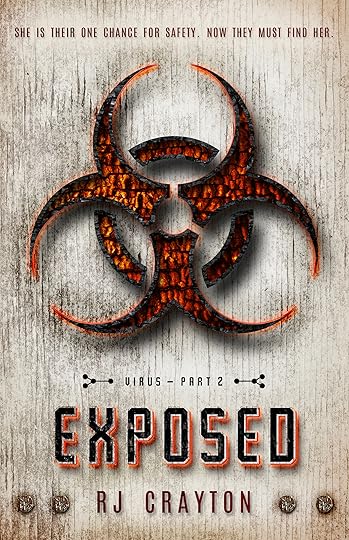
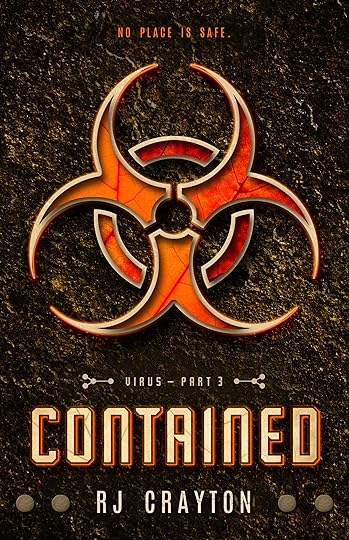 The Virus series is available on Amazon.
The Virus series is available on Amazon.



